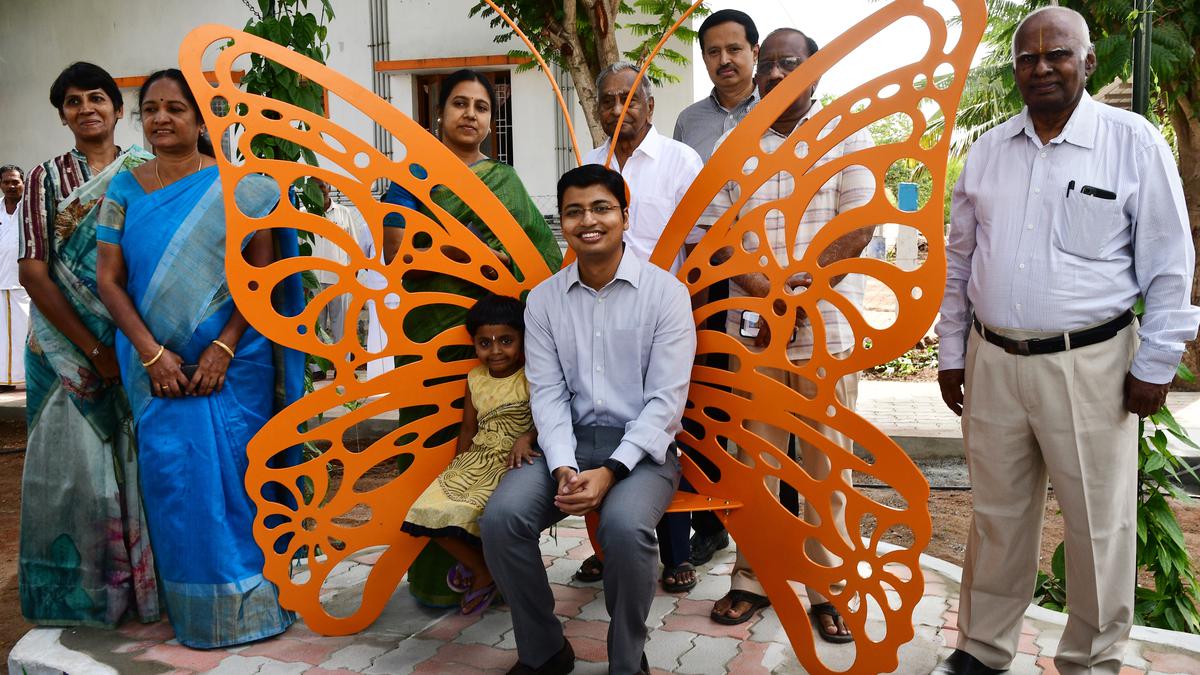
Biodiversity park opened at Sulur near Coimbatore
The Hindu
Coimbatore district's Venkatachalam Nagar near Sulur gets a park promotes biodiversity & community bonding. Propel Industries' CSR initiative, in association with district admin & Sulur town panchayat, houses 300+ varieties of plants, trees, gym, library & volleyball court. Aim is to create a place for all to spend time & bond. ₹24 lakh spent on 50 cents reserve site. Board games to be introduced.
The biodiversity park opened at Venkatachalam Nagar on Kalangal Road near Sulur in Coimbatore district on Tuesday is aimed at promoting biodiversity and community bonding.
The park houses more than 300 varieties of plants, rare trees, herbal and aquatic plants, walkers’ path, children’s play equipment, outdoor gym, selfie spot, mini library, metal art installation and a volleyball court.
A corporate social responsibility (CSR) initiative by Sulur-based Propel Industries Private Limited, the project was implemented by the Residents Awareness Association of Coimbatore (RAAC) in association with Coimbatore district administration and Sulur town panchayat.
Coimbatore District Collector Kranthi Kumar Pati inaugurated the park in the presence of Devi Mannavan, president of Sulur town panchayat; A.V. Varadharajan, chairman of Propel Industries; Senthil Kumar, managing director of Propel Industries; R.R. Balasundaram, president of RAAC; and R. Raveendran, secretary of RAAC.
Vidhya Senthil Kumar, director (CSR and branding) of Propel Industries, said the main aim of developing the park was to create a place where all members of the community, from children to senior citizens, can spend time and develop the community bonding, which is being lost nowadays. She added that board games would be introduced in the park in the future.
Propel Industries spent around ₹ 24 lakh under CSR to develop the park on a reserve site of 50 cents, which already had trees and a compound wall. Ms. Senthil Kumar added that garden designer M. Thenmozhi from Sivam’s Thulir nursery selected plants that attract butterflies for the park.

“Writing, in general, is a very solitary process,” says Yauvanika Chopra, Associate Director at The New India Foundation (NIF), which, earlier this year, announced the 12th edition of its NIF Book Fellowships for research and scholarship about Indian history after Independence. While authors, in general, are built for it, it can still get very lonely, says Chopra, pointing out that the fellowship’s community support is as valuable as the monetary benefits it offers. “There is a solid community of NIF fellows, trustees, language experts, jury members, all of whom are incredibly competent,” she says. “They really help make authors feel supported from manuscript to publication, so you never feel like you’re struggling through isolation.”

Several principals of government and private schools in Delhi on Tuesday said the Directorate of Education (DoE) circular from a day earlier, directing schools to conduct classes in ‘hybrid’ mode, had caused confusion regarding day-to-day operations as they did not know how many students would return to school from Wednesday and how would teachers instruct in two modes — online and in person — at once. The DoE circular on Monday had also stated that the option to “exercise online mode of education, wherever available, shall vest with the students and their guardians”. Several schoolteachers also expressed confusion regarding the DoE order. A government schoolteacher said he was unsure of how to cope with the resumption of physical classes, given that the order directing government offices to ensure that 50% of the employees work from home is still in place. On Monday, the Commission for Air Quality Management in the National Capital Region and Adjoining Areas (CAQM) had, on the orders of the Supreme Court, directed schools in Delhi-NCR to shift classes to the hybrid mode, following which the DoE had issued the circular. The court had urged the Centre’s pollution watchdog to consider restarting physical classes due to many students missing out on the mid-day meals and lacking the necessary means to attend classes online. The CAQM had, on November 20, asked schools in Delhi-NCR to shift to the online mode of teaching.









